The Politics of Pandemic
Over a year on, Covid-19 remains a source of much polarisation across the world
KARACHI:We hope life-changing events will bring out the best in us. Especially when they take place on a global scale. We hope people would set aside their differences, come together as one and focus their collective attention and abilities on the challenge that confronts them.
To some extent we do. And we did and continue to do so, as we grapple with the novel coronavirus that continues to rage across many parts of the world. But somewhat shockingly, it also revealed how divisive a simple disease can be and how complicated tackling it could become.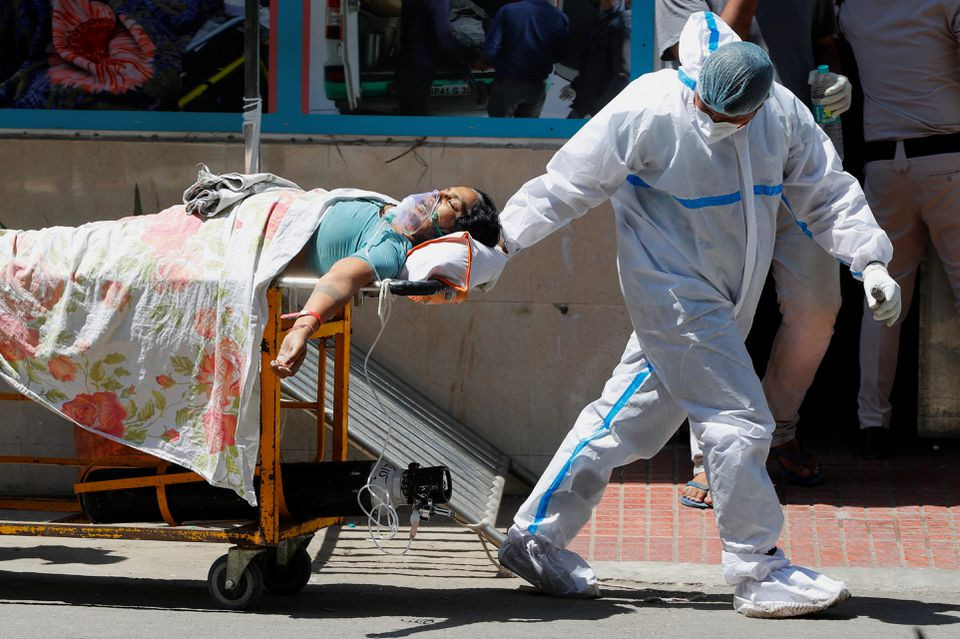
Much of it comes down to politics, an undeservingly dirty word to many of us. We hoped, when the scale of the pandemic first became apparent, that politics would be set aside and we would be able to agree on pursuing the ‘greater good’. There is a problem with that idea to begin with. Even if we do agree to set aside our personal prerogatives for the greater good, everyone’s idea of just what that is can be wildly different. Still, many of us stand stunned and perhaps even ashamed at how politicised the pandemic has become.
In times of crisis, it is sometimes helpful to turn to history. We may use it to develop some perspective on our present – it is certainly reassuring to know that no calamity, however world altering, is permanent. Life as we know it may change, but it still goes on. Better times eventually follow.
History can also let us know that exceptional as we think we and our circumstances are, for better and for worse we are not different from those that came before. In this regard, particularly, The Express Tribune sought out Dr Peter Baldwin, a professor of history who has written extensively on pandemics past and present. His most recent book, ‘Fighting the First Wave’ seeks to explain why national responses to the novel coronavirus varied so much from country to country.
Inherently political
Speaking about the level of to which the coronavirus has been politicised in various nations, Dr Baldwin shared that the phenomenon was not as uncommon in history as many may seem to believe.
“The thing about pandemics is that if there is a medical solution – a cure or a vaccine, or something preventive – then it is not really a political problem. It does not become politicised,” he said. “But for contagious diseases that spread from person to person... ones that are not venereal and involve sexual activity … normal everyday actions like breathing around people are enough to spread it … the only means you have of controlling them is to impose traditional measures of contagious disease prevention that we have used for thousands of years, since Biblical times.”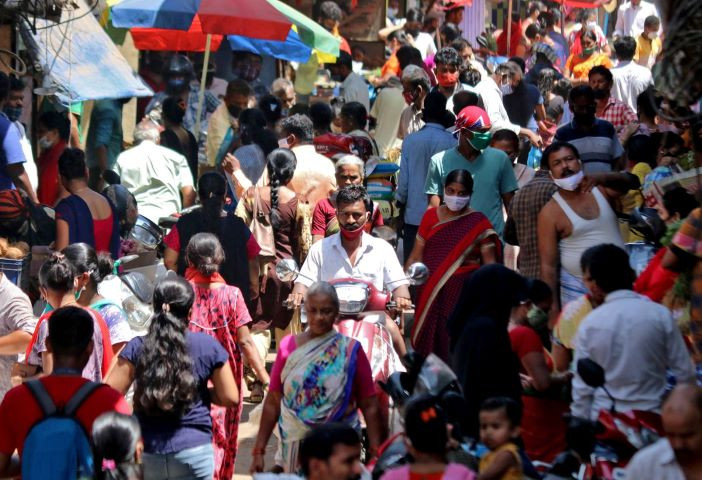
People are seen at a crowded marketplace in a slum area, amidst the spread of the coronavirus disease (COVID-19), in Mumbai, India, April 23, 2021. REUTERS
According to Dr Baldwin, these traditional measures take the form of keeping people you think are infected isolated and maintaining some separation from them. “Or if you think you yourself are infected, you do not congregate with others. [In both cases] you cut the chains of transmission. That is really the only tool we have.”
These measures, by their very nature and design, concern behavioural management. “That, of course, is inherently political. It is something where you are telling certain people that ‘you must behave in a certain way’ in order that others are not infected or endangered,” he said. “And so, there are clear losers and winners.”
He pointed out that this is especially true for a disease like Covid-19, where an awful lot of the people who have it are asymptomatic and do not even know that they are infected. “They certainly do not feel infected and yet they pose a worse threat to others than people who are symptomatic,” he said. “Those that are sick and in bed do not mind getting isolated. They would be doing that anyway. It is the asymptomatic ones who are the really big concern because they do not see any reason as to why they should isolate and want to go on living their lives as normal.”
According to Dr Baldwin, there is a clear political tradeoff when you tell certain people they must behave in a certain way for ‘the good of the rest’. “When some people lose and some people win, it is a classic instance of politics. For epidemics, the weird thing would be it they were not politicised,” he noted.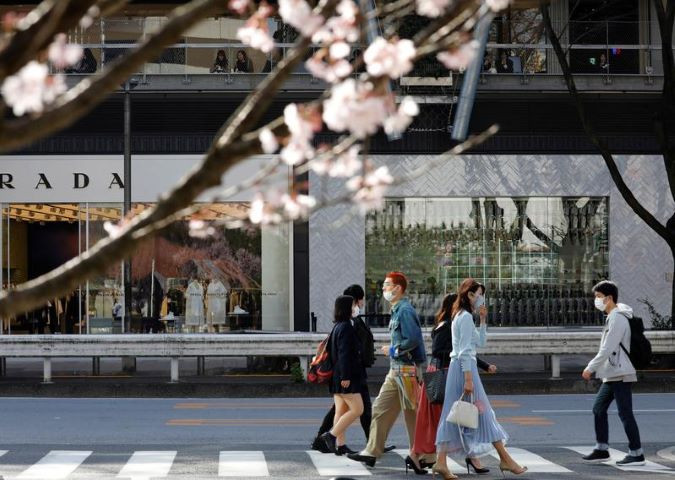
FILE/PHOTO: REUTERS
Fractured societies
Certain countries, of course, did seemingly manage to sidestep the politicisation of Covid-19 and the response to it. Dr Baldwin mentioned New Zealand as one example. “New Zealand’s prime minister spoke about her ‘team of five million’, implying that all New Zealanders understood what the issue was and that she was doing the ‘right thing’,” he said. “I am sure that was not quite the case on the ground … some people in New Zealand probably did not do what they were supposed to and may have faced some punitive measures … but on the whole, compared to other countries, New Zealanders seemed to have faith in their government and realized she was asking them to do the right thing.”
So what sets countries that did see a pandemic response being heavily politicised apart from ones like New Zealand? According to the historian, those nations were ones that were ‘heavily politically divided anyway’ with or without Covid-19. “Like Brazil, the United States or the United Kingdom. Most European countries, in fact… the first wave was not as bad and citizens generally cooperated… but by the time they got to the fall and winter, citizens were getting fed up and there were a lot more protests,” he said. “It is becoming a real political problem now. People have decided they have had enough and they do not really think that these measures work.”
Dr Baldwin also pointed out an interesting trend globally when it came to Covid-19. “One of the things that has been clear from last April is that the pandemic is hitting the working and ethnic minorities harder in the West than middle class white people,” he said. “But if you look at it in global terms, what is very interesting is the extent to which its slowly becoming apparent that it is actually a disease that hits the developed world much harder than the developing world.”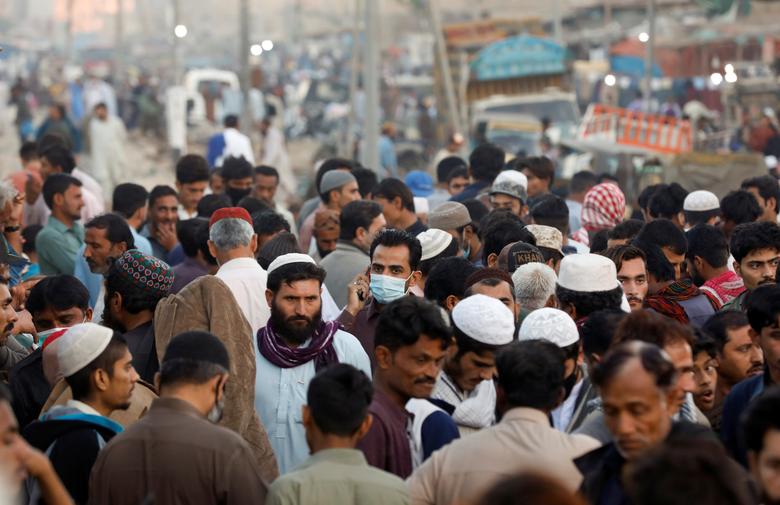
A man wearing a protective mask walks through a crowd of people along a makeshift market as the third of the deadly Covid-19 pandemic grips nation. PHOTO: REUTERS/File
Pandemics in history
Speaking about earlier epidemics in human history, Dr Baldwin said that “similar things happened then for similar reasons,” in a manner of speaking.
“The big change I would say comes sometime around the early 19th century. The issue was the first cholera epidemic, which hit Western Europe,” he shared. He placed the response to that epidemic in the context of newfound political developments and awareness in the western world at the time.
“The big difference there between what the governments did with the cholera epidemics of the 19th century and what they had done earlier – like during the plague in the Middle Ages – was simply that now we were living in a democratic era,” Dr Baldwin pointed out. “This is after the American Revolution, this is after the French Revolution. Most Western countries had begun to have some semblance of voting and democracy and civil rights.”
According to the historian, rulers tackling the plague in the Middle Ages had the option to lock people with the disease up or close down the town gates to keep visitors out. “It was the same way that if you were a leper, you were put in a leper house and nobody thought twice about it,” he said.
But with the rise of democracy, ‘subjects’ became citizens with basic rights. “So when you say ‘we need to lock you up’ or ‘you cannot come here’ or ‘you have to stay in your home’, suddenly it becomes a political issue,” Dr Baldwin said. “In a sense you can argue politics have been invented for the first time with the democratic revolution.”
He further explained that politics in the Middle Ages were not politics in the sense most of us understand today. “Certainly there were not citizens who had a claim not to be treated a certain way. In that sense, disease or disease prevention inherently became politicised when politics were ‘invented’ with the beginnings of democracy.”
Undermining disease control
Taking it to the current pandemic, Dr Baldwin said, “you could plausibly argue – and I am not making this argument myself as such – that in a sense democracy has gone so far that it has undermined our ability to contain disease.”
He noted that one of the things that have discovered in dealing with this pandemic is that the countries that can just “crack the whip – where the leaders have strong powers, like autocracies like China – they did quite well.” The Chinese authorities in particular were able to clamp down on people who were infected and shut down entire regions, thereby sparing the rest of the country. “In autocracies you have the tools to do that… to impose sacrifices on certain people to spare other people… You can tell people to stay at home and arrest them if they do not.”
With some exceptions, like the aforementioned New Zealand, Australia and South Korea, the historian admitted that democracies did appear to do worse in handling Covid-19. “You have to ask yourself what is the difference between democracies that did well and those that did poorly,” he said. “Democracies that did well were the ones where the population effectively said ‘we trust and believe in our leaders and we are willing to do what they say without making a big fuss’.”
Reiterating his earlier point, he said that when you look at democracies that did not do well, they are the ones that are the most contentious, with the least consensus. “They are also the ones that are the most multi-cultural and culturally fragmented. They are the ones where you cannot assume everyone thinks the same way.”
PHOTO: REUTERS/FILE
Civil rights taken too far
“One could argue that in some democracies the idea of individual rights, that people have a claim not to be locked down, not to have to wear a mask, possibly not to be vaccinated, has been taken too far,” suggested Dr Baldwin. Looking at it from a functional point of view, he brought up the example of the controversy around contact tracing apps.
“Those kinds of things were tried in lots of different Western countries, but all the people who were worried about privacy rights said ‘this is a violation of your privacy’,” he said. “So these apps, that could measure proximity to the phone of some other person who has been infected, were not allowed to record location, even though lots of other apps like Google Maps are already doing so.”
“Because they could not know where you had been, in effect, these tracing apps could not work. What would have been a very important tool for epidemiologists trying to handle the pandemic was just eliminated because privacy was more important,” he added.
Dr Baldwin said that he would be willing to argue that in a situation like this civil rights were taken too far. “In the middle of a epidemic, it is not unreasonable to say ‘look, we have got to put privacy rights on the backburner for the moment’. In the midst of an epidemic, would I rather have an app that tracks wherever I go but tells me if I have been possibly infected. Would I rather have that and be able go out or would I rather stay at home because we don’t have that app?”
He extended the same argument for masks. He noted that in Asia, everyone has been wearing masks for decades now. Oddly enough, the Asians learned about wearing masks from the Americans in the Spanish Flu epidemic in 1918, he pointed out. “The Americans wore masks then but stopped and never did it again, but the Asians figured out that it was not a bad idea and they made it a habit.”
“In what universe is being required to wear a mask a violation of civil rights? It’s just crazy,” the historian stressed. “We wear seatbelts, put on helmets when we ride motorcycles. In America, if you go to a restaurant, there are always these signs that say ‘no shoes, no shirt, no service’. We tolerate these sorts of limitations all the time. Why on earth is wearing a mask regarded as some sort of totalitarian imposition? I just don’t get it.”
The role of the Internet
Asked if the Internet and social media had played a role in exacerbating politicisation and polarisation in times of Covid-19, Dr Baldwin opted to look at it from a different lens.
“Social media and the Internet in general makes it easier to communicate, and obviously there was an enormous amount of bad information, but there is also a good side to it,” he said. “The ability to exchange information rapidly… scientific information spread much more quickly in this epidemic than it ever has before.”
“Another positive is that countries compared themselves with each other,” he pointed out. “There was a much clearer sense of who is doing well and who is doing poorly. Leaders could no longer hide behind the lack of information.”
“Would it have been better if we turned the Internet off during the epidemic? Probably not,” he added. “On the whole, the upside of the transparency of response enabled by the Internet generally outweighs the downside of all the nonsense out there. And the exchange of scientific ideas probably paid for itself.”
Vaccine resistance
When it comes to resistance to vaccines, Pakistanis are no strangers to the attitude. For misunderstood religious and other reasons, significant pockets of resistance persist in the country – a major reason why Pakistan has so far been unable to eradicate polio, for instance.
For most Pakistanis, however, given the popular impression of the West as supposedly ‘rational’, vaccine resistance among certain groups remains puzzling. Asked to demystify that trend, Dr Baldwin revealed a surprising fact.
“Interestingly, the most vaccine resistant country in the world is France, home of the ‘Enlightenment’, home of Pasteur and the kind of biomedicine that led directly to the creation of vaccines,” he said. "In the West, the Catholic church too is against certain vaccines because it thinks it derived from fetal tissue that in turn was taken from aborted fetuses. Western Europeans in general are worse than Americans when it comes to vaccines.”
According to Dr Baldwin, this resistance has been persisting ever since the first vaccines were developed in the 19th century. “There was resistance against small pox vaccinations. You could say the argument back then made more sense because the technology was sort of primitive and some people did die because of complications. You could transmit other diseases while vaccinating.”
“But with anything that you do in huge numbers, there is going to be a correlation,” he explained. “There is always the risk of complications and we have seen it with AstraZeneca and the blood clots. But some people may die for strange reasons, even if all you do is dump a bucket of water on their head. That does not mean they will die because of the bucket of water.” He added, however, that people who will ‘kick up a fuss’ will draw that conclusion anyway. “They will turn correlation into causation.”
Even so, he suggested that when everything is said and then and when everyone in the world has been offered a vaccination for Covid, those who actively refuse it would not be all that many. “Because the choice is between sitting at home, running the possibility of getting sick and not being allowed to get on buses or going to the movies, I’m sure most people will come to their senses. I am sure at some point there will be behavioural restrictions on those who refuse vaccines.”
The democratising effect of germs
In a broader sense, how has our understanding of diseases helped society? Speaking on the history of the germ theory, Dr Baldwin shared that when it was first developed it had an almost demorcratising effect on wider society.
“Before the theory was articulated, diseases were thought to arise from filth and living circumstances,” he explained. “So there were certain groups of people – the poor and marginalised, the beggars, gypsies and Jews, people the majority thought as belonging to social edges –were thought of as being particularly diseased because they lived in poor circumstances, with filth and together with animals.”
“In a sense, the germ theory became democratic because it showed that anyone can get sick and it was something you could not control by just cleanliness or by living the way the middle classes did. And even people who were well off could also get sick,” he added. “There is a kind of sense in which it makes all human beings equal because we can all get sick from this microorganism. Whereas if you think of disease as rising from filth then only people who live in certain ways can get it.”
As for pandemics, while they have been used to target certain persecuted communities in history, Dr Baldwin shared a counter-intuitive view. “There is this book by Samuel Cohen called ‘Epidemics’. His basic premise is that even though we think that in a pandemic most people band together to blame a group of outsiders, what actually happens in most societies is that people sort of coalesce and try to help each other.”

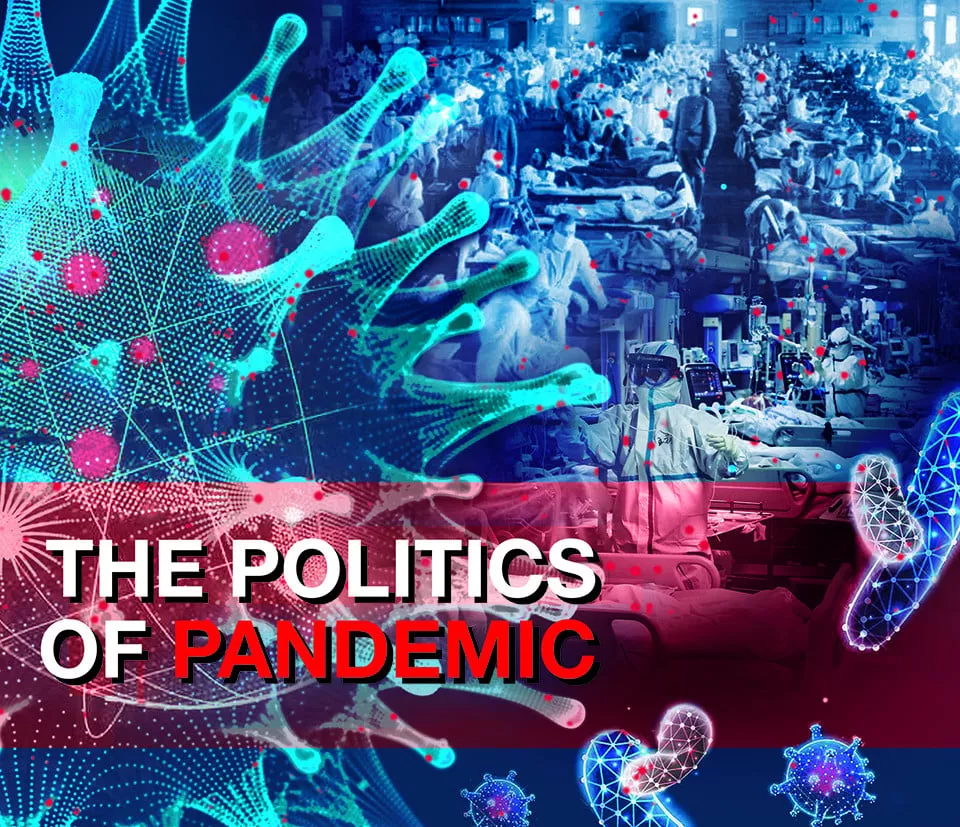
COMMENTS
Comments are moderated and generally will be posted if they are on-topic and not abusive.
For more information, please see our Comments FAQ